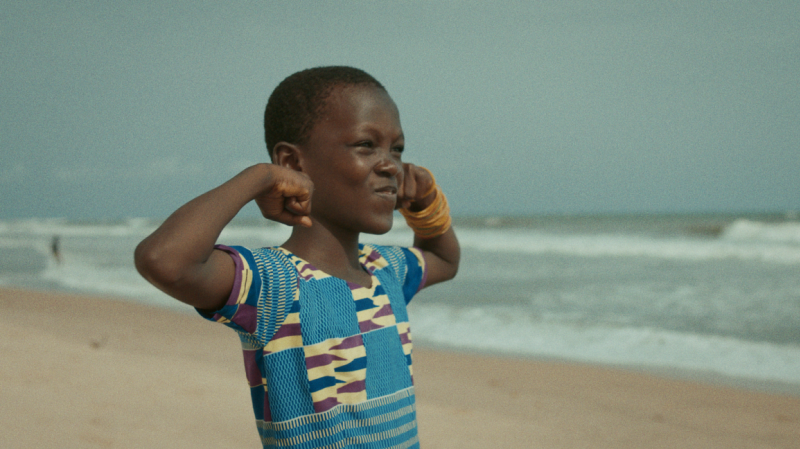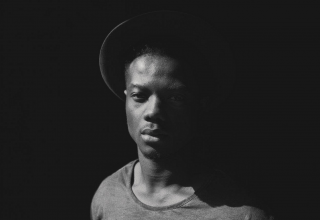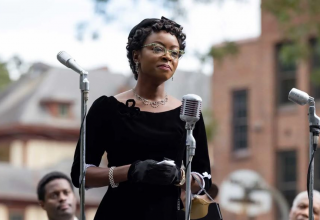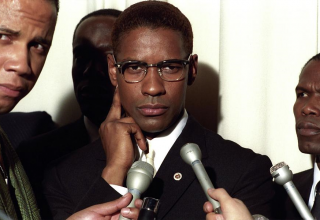
In writer-director Anthony Nti’s short film ‘DA YIE’, he authors a comprehensive and compelling intel of two children exposed to a day’s activities that does not conform to their familiar playground.
‘DA YIE’ co-written by Chingiz Karibekov is at its entertaining best right from the opening scene. The audience is introduced to Matilda (Matilda Enchil), the adventurous female among a male coterie of friends, who naturally exhumes harmlessness but fierceness in her actions. The scene employs Matilda and her friends to deliver two fowls set free for the purpose of a hunt, which will later reward the winner with an autonomous power of selecting his/her team players for a scheduled soccer game. Matilda pulls an obvious win and goes ahead in selecting her team players including the not present Prince (Prince Agortey), phoned from home to come participate despite his mother’s strict instructions to stay indoors. Prince’s arrival tallies the entire discussion the film is about, as the other child who gets entangled with Matilda as the disturbing day sets in.
The first dialogue ensued between Matilda and Prince establishes a long-standing friendship that appeals to community children bound by common interests. Without wasting valuable screen time, Anthony reintroduces the film’s third pillar, Bogah (Goua Grovogui), characterised as a foreign figure admired by all and sundry in the vicinity (children to be precise). In his instant appearance, Matilda and Prince are marvelled by his car, albeit simple, and as a result easily get convinced to embark on what would be an exciting adventure for them. Prince is hesitant to accept the offer, but Matilda’s foolhardy personality lures him to follow suit.
In between activities of the fun car ride, Bogah’s innate inclination to rage is exploited: an overly defensive guardian at a bar and a quick-tempered driver to a wind screen cleaner. At this point, Bogah’s actions sharpen some concern of safety from Matilda and Prince. They spontaneously become mindful of the time and request to be taken home. Their solicitation is debunked with a humble negotiation from Bogah to make a minute stop at a friend’s place before taking them home.
Unlike most features, which give up its climax in a patent format, ‘DA YIE’ staggeringly throws audience into a limbo by turning Bogah’s initial intent the other way round. He resigns from handing over Matilda and Prince to his syndicate of traffickers, at the expense of his own safety.
The shift settles audience into a relief space, but thrust the two main characters into desperation and panic as they have to secure their safety. Matilda articulates the words ‘Da Yie’ to Prince after their near kidnapping situation. This shift sets the tone for the end of the film, at the same time providing concrete reference as to why the title ‘DA YIE’.
In demonstrating how inclined he is with storytelling, Nti doesn’t linger much on the aftermath of the trauma, but quickly zooms into how both characters scrap the day’s event behind them: Matilda takes a serene shower, while Prince hides the camera he controlled, which harbours all the memories of the time spent with Bogah.
‘DA YIE’s’ quiet commentary on child trafficking and kidnapping is one of its biggest strength. One might argue that its short form shelves it from committing an error in the long run, but throughout the film, Nti wants us to enjoy the palpable connection between two innocent friends, who unknowingly get intercepted by an unfamiliar force. It accommodates the best of friendships, the showcase of great talent and welcomes the act of remorse. This sort of storytelling propels younger audience to appreciate their curiosity, while prompting some sense of limit in their mingling with strangers.
It doesn’t rush into giving children a scare, neither does it entirely attribute danger with foreigners. Case in point: It was a foreigner’s plot to prey on the innocence of children, but reverts from the original plan, which later carved an escape route for the children.
The short film also nuances the issue of gender roles and expectations in our African community. It is refreshing to see a major switch from the norm. In a story that narrates an ordeal between both characters equally, we see Matilda as the fiercer and physically stronger counterpart of the two friends which is a different outlook from what would usually be the case – Prince, the male friend would be the leader or dominant friend.
Matilda and Prince are fantastic in the film. They both comply with the everyday lifestyle of playful community children, creating an intriguing onscreen chemistry that doesn’t initiate major fallouts. Matilda speaks to the wild side, while Prince interprets the reserved but well-packaged daring boy. Bogah delivers a promising performance that speaks volume of a short film; he is just fine with the role.
The visual style of the film is simple yet exciting. Perhaps, this is intentionally done because of the film’s main players. Though the prevailing issues in the film are complex and dark, the pictures were full of innocence and youthful zest at every turn. The images are captured as is, showing the characters in their most natural and almost vulnerable states throughout. If the cinematography has anything to do with it, ‘DA YIE’ paints the most shockingly honest reality of life in the slums. The brilliance in the last scene of the short film remains the most remarkable. The heaviest feeling of nostalgia is evoked with an aerial view of the kids singing the Ghanaian national anthem at their school morning assembly.
In totality, ‘DA YIE’ is an eye-opening piece that creates much awareness on the little things we unconsciously overlook.
BY: Brimah Mahmoud & Larry Adams
Director: Anthony Nti
Writers/Producers: Anthony Nti, Chingiz Karibekov
Director of Photography: PJ Claessens
Editor: Frederik Vandewalle
Sound: Vincent Struelens
First AC: Jordan Vanschel
First AD: Chingiz Karibekov
Sound Designer: Seppe Monbaliu, Eli Sundermann
Foley Artist: Flo Van Deuren
Producer: Charles Nti
Executive Producer: Nicole Baiken
Co-producer: Caviar
Associate Producer: Dimitri Verbeeck
Fixer: Anthony Yeboah
Floor Manager: Clement Gyegye
Art Directors: Pjizzle, Chale & Chingz
Composers: Maxim Helincks, Milco Geryl
Cast: Prince Agortey, Matilda Enchil, Goua Grovogui










